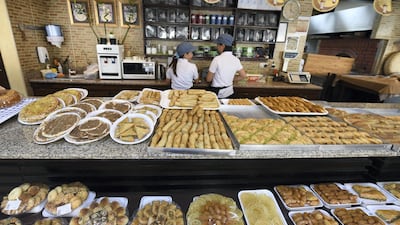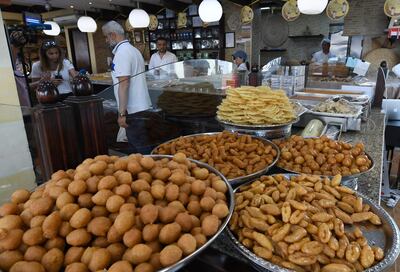Nida Mohammed drives for more than an hour from Fujairah to Sharjah just to buy special Iraqi sweets and juices for Ramadan.
"Over there [in Fujairah] you can't find Iraqi stuff," Mohammed says, as she picks up her order of sharbet zbeeb, or raisin juice, a special Iraqi drink taken to break the day-long fast.
The UAE is home to more than nine million expatriates who form 90 per cent of the population.
During Ramadan, immigrants in the Gulf state reconnect with traditions from their homeland, especially the rituals of breaking the fast and partaking in traditional desserts and juices.
Shops such as these help "remember the country we came from", says Mohammed, who makes the journey with family members and stocks large quantities of Iraqi sweets.
Far away from their homes, many of which are in conflict zones, immigrants still get a taste of their culture from their traditional foods and desserts.
"Every country has its own culture when it comes to their desserts, especially for Ramadan," says Samer al-Kasir, the Syrian general manager of Al-Sultan sweets in Dubai.
"These sweets here are based on Syrian traditions," he says, pointing to a mosaic of sweets packaged neatly in a box.
Men, women and children are seen gazing at the array of items on display in glass door fridges - each taking their time before placing their orders.
Decades-old tradition
The owner of Al-Rabat sweets store, where Mohammed does her shopping, says he opened the business in 2006 to serve the Iraqi community in the UAE. "Iraqis did not have a special place catering for them, so I opened this place... because some of the baking is different to other [Arab] traditions," says Wesam Abdulwahab.
"Most of our customers are Iraqis. They consider this place one that brings them together. We get our goods from Iraq, stuff that may be difficult to get here."
For Saad Hussein, the items offered in Al-Rabat coupled with the spirit of Ramadan bring back memories of his childhood, particularly a popular game called Mheibes.
In the game, men - traditionally from different neighbourhoods - are divided into two groups and have to guess which member of the opposing team is hiding a ring, or mahbas, in their hand.
"Of course, during the games, Ramadan foods and sweets are distributed," adds Hussein.
Seemingly out of place, yellow boxes of Jordanian Tutu biscuits are stacked near the register and on the shelves of Al-Rabat. Abdelwahab says that Tutu, although not Iraqi, represent something significant for his countrymen.
During the Iraqi war in the early 1990s, he explains, people had little access to sweets from abroad - except for Tutu. "Tutu was an exceptional treat that brings back memories of enjoyment for Iraqis," he says.
Tempting tastes
In Dubai's Satwa district, Ahmed Naveed from Pakistan is standing in front of his family's shop taking orders for different kinds of samosas. Residents from all walks of life, including Emiratis, stand in line on the busy street to get their fried and baked pastries for iftar.
Qudsia Osman, who hails from India, was driving past with her mother when they decided to stop at the shop after being drawn in by the sight and scent of the food. "It's very tempting. When we passed by and saw it, we got carried away," Osman says, adding she is pleased the UAE includes an array of communities to cater to different cultures.
"I was born and brought up in Dubai... it is my home," she says.
Mohammed Shiraz, a Pakistani who has been living in the UAE for nearly 20 years, also considers the emirate his home. "The UAE caters to the population," he says, explaining he enjoys the holy month in the Gulf state for all the Ramadan offers and promotions.
But for many, although the UAE has become a place where they have started new traditions, the taste of home resonates with them. "In the old days, it wasn't like now. Food preparations were done at home, including desserts," Abdelwahab says.
"My mom, of course, used to do it," he says. "Her food is still better than anything I've ever had."


